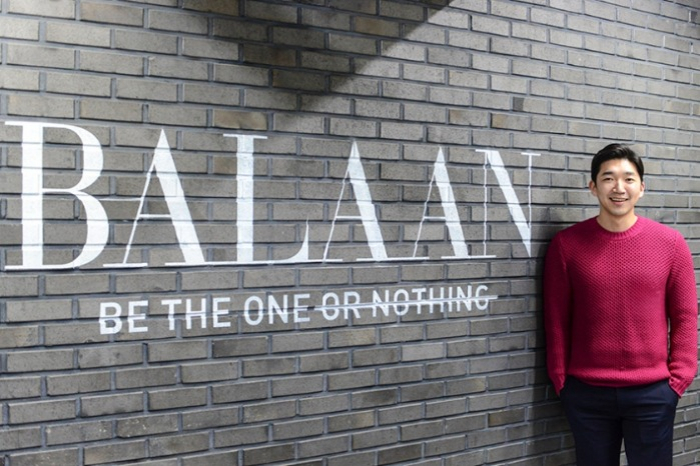E-commerce
Korea's luxury e-commerce platform Balaan completes Series C
The latest funding round reaches $17 million; the company will improve its financial structure as operating loss soars
By Oct 16, 2022 (Gmt+09:00)
2
Min read
Most Read
LG Chem to sell water filter business to Glenwood PE for $692 million


Kyobo Life poised to buy Japan’s SBI Group-owned savings bank


KT&G eyes overseas M&A after rejecting activist fund's offer


StockX in merger talks with Naver’s online reseller Kream


Mirae Asset to be named Korea Post’s core real estate fund operator



South Korean luxury e-commerce platform operator Balaan Co. will complete the attraction of 25 billion won ($17.3 million) in investment in a Series C Funding round by the end of October, the company said on Friday.
Three Korean venture capital firms — Shinhan Capital, Company K Partners and Daol Investment —have committed a combined 20 billion won. Other two VC firms will participate with a combined 5 billion won commitment, Balaan said.
The luxury shopping platform operator has attracted 73.5 billion won since its founding in 2015.
The company will use the funds to improve its profit structure. It has shifted its short-term plan from aggressive M&As to a revised business expansion scheme focusing on increasing net profits.
Balaan posted 52.2 billion won in revenue last year, more than double the 24.3 billion won in 2020. But its operating loss has nearly tripled to 18.5 billion won last year from 6.3 billion won in 2020.

ONLINE LUXURY PLATFORMS BLEEDING AMID FIERCE COMPETITION
Balaan and its local competitors in luxury e-commerce, Trenbe Inc. and Must'it Inc., have grown their businesses rapidly thanks to the online shopping boom during the COVID-19 pandemic and increased spending on luxury items by millennials and Gen Z'ers.
The three Korean e-commerce platforms operate using the same basic structure of import and sale of global luxury goods.
Global luxury fashion headquarters send goods to fashion boutiques with which they have signed trading contracts.
If a Korean consumer places an order on one of the luxury e-commerce websites, a local importing firm that can procure the item sends the order details to one of the boutiques or to other importers that have the product in stock. Once the Korean importer receives the item, the company delivers it to the consumer.
But the Korean luxury e-commerce platforms have been criticized for their inconvenient servicing of product exchanges, returns and refunds as well as high fees for returns. In May, the platform operators were investigated by Korea’s Fair Trade Commission for possible violation of consumer protection in e-commerce.
Many consumers have expressed suspicions over whether some heavily discounted products on the platforms are genuine.
In July, Balaan admitted that a pair of Nike sports shoes it sold was a fake, explaining that its partner, a local importer, wasn't aware that the item was a copycat when it imported the shoes from Japan three years earlier.
Amid the unfavorable reports and interest rate hikes, Balaan has had to cut back its Series C funding amount from the 100 billion won it originally planned.
The three e-commerce platforms are seeing their losses mount due to full-throttle marketing battles amid fierce competition. Trenbe’s annual revenue rose to 21.7 billion won in 2021 from 17.1 billion won in 2020, but its operating loss soared to 33 billion won from 10.1 billion won.
Must’it increased its revenue to 19.9 billion won in 2021 from 12 billion won in 2020, but it posted an operating loss of 10 billion won last year that swung from 1.4 billion won of profit in 2020.
Write to Jeong-Cheol Bae at bjc@hankyung.com
Jihyun Kim edited this article.
More to Read
-
 E-commerceSSG.COM joins race for top spot in luxury online shopping in Korea
E-commerceSSG.COM joins race for top spot in luxury online shopping in KoreaJul 04, 2022 (Gmt+09:00)
2 Min read -
 RetailSouth Korean millennials pay premium for authentic luxury items
RetailSouth Korean millennials pay premium for authentic luxury itemsMay 31, 2022 (Gmt+09:00)
4 Min read -
 Behind the ScenesSouth Koreans turned off by luxury fashion houses’ price hikes
Behind the ScenesSouth Koreans turned off by luxury fashion houses’ price hikesMay 11, 2022 (Gmt+09:00)
4 Min read -
 Korean startupsS.Korea’s luxury e-commerce startups poised to become unicorns
Korean startupsS.Korea’s luxury e-commerce startups poised to become unicornsApr 14, 2022 (Gmt+09:00)
3 Min read -

Comment 0
LOG IN


